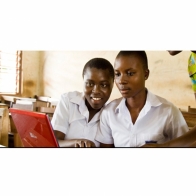Nigeria has introduced a new senior secondary education model that emphasizes the skills as well as the academic development of learners. The skills component of the model is being pursued through the teaching and learning of 34 vocational (trade-based) subjects developed by the Nigerian Educational Research and Development Council (NERDC), Nigeria’s agency for curriculum development.
The trade subjects, which are taught together with the academic oriented school subjects, allow students to acquire specific vocational skills in at least one trade area, based on students’ choice. A fundamental gap was observed after five years of implementing the new education model. It revealed that, while students had learned the trades, they lacked the entrepreneurial skills and ingenuity to deploy the acquired skills for profitable economic ventures.
In 2017, the 34 trade curricula were reformed and a new trade and entrepreneurship curriculum was introduced to provide students with practical opportunities to acquire entrepreneurial competences alongside their trade-specific skills, by taking part in in-school small-scale businesses ventures, to prepare them better for the world of work.
NERDC piloted the revised curriculum before attempting full-scale introduction across the nation. The very helpful piloting stage provided the opportunity to assess the strengths and weaknesses of the curriculum before full-scale nationwide implementation. In the course of piloting, NERDC was able to scale up interaction with teachers and school managers, thereby improving mentoring and school support services. NERDC has also gained a better insight into the serious drawbacks that hinder effective curriculum implementation across Nigeria’s complex school system.
NERDC is currently taking a critical look at the entire school curricula with the intention of making them much more responsive to the critical needs of the country. It has developed new contents, including financial literacy education, capital market studies, trafficking in person education, and online safety education, that are now being infused into existing school curricula. These new contents aim to support Nigeria’s drive for entrepreneurship and human capital development in a digitally inclined society.
Additionally NERDC is developing an ‘education in emergency curriculum’ for the formal education sector to serve the needs of thousands of internally displaced school age children affected by insurgency and other forms of crises. This curriculum is designed to enable children to cope mentally and emotionally, and above all, prepare them for reintegration into the formal school system.
Dr Ajagun, Nigerian Educational Research and Development Council (NERDC).
